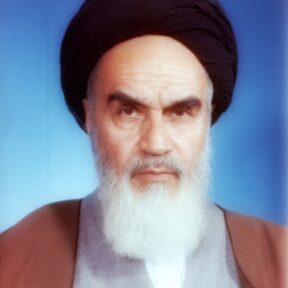
Ayatollah Ruhollah Khomeini
: Photo from Wikipedia / Author of Photo: Author UnknownOverview
* Iran’s head of State from 1979 until his death in 1989.
* Founder of modern Islamic jihad.
* Human rights abuses and the torture of political enemies routine under his rule.
* Issued a fatwa authorizing the execution of Salman Rushdie, whose book The Satanic Verses he believed was blasphemous against the prophet Mohammed.
Born on May 17, 1900 in the Iranian town of Khomein, Mr. Khomeini was elevated to the status of Ayatollah in the 1950s. Because of his frequent criticisms of the Iranian government, he was exiled in 1964. He stayed in Iraq until he was forced to leave in 1978, and thereafter went to France until February 1, 1979, when he returned home at the invitation of Iran’s anti-Shah revolutionaries. Within ten days after his homecoming, Khomeini seized power and formed an Islamic Republic of which he himself was Head of State for life. Early in his rule, Khomeini was popularly known as “Leader of the Revolution.” Later he held the title of “Supreme Spiritual Leader.” He is considered to be the founder of the modern Shiite State, and he called for similar Islamic revolutions across the Middle East.
Implementing Shia Islamic Law, Khomeini’s regime quickly ended the Westernized society that had existed under the Shah. Strictly enforced Islamic dress codes were instituted for both men and women. Women’s rights, freedom of speech, and freedom of the press were greatly curtailed. Human rights abuses and the torture of political enemies became commonplace. The United States became entangled in the revolution when, for 444 days between 1979 and 1981, Khomeini’s followers held 52 Americans hostage in Tehran’s U.S. embassy.
In early 1989, Khomeini issued a fatwa declaring that Muslims had a religious duty to kill author Salman Rushdie, whose book The Satanic Verses Khomeini deemed a blasphemy against the prophet Muhammed. “The author of the Satanic Verses book,” said Khomeini, “which is against Islam, the Prophet and the Koran, and all those involved in its publication who were aware of its content, are sentenced to death. I ask all Muslims to execute them wherever they find them.” This event caused many Western leftists, who had largely supported the revolution against the Shah, to reconsider their support of Khomeini.
Khomeini’s fatwa against Rushdie was consistent with his preferred method of dealing with “infidels.” “If one permits an infidel to continue in his role as a corrupter of the earth,” said Khomeini, “his moral suffering will be all the worse. If one kills the infidel, and this stops him from perpetrating his misdeeds, his death will be a blessing to him.”
Khomeini ruled Iran until his death in 1989.